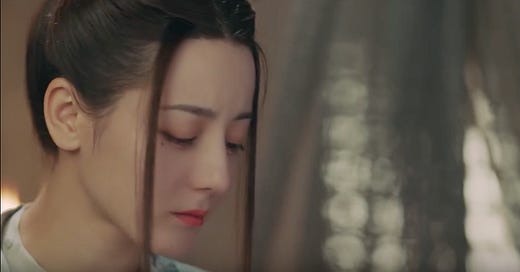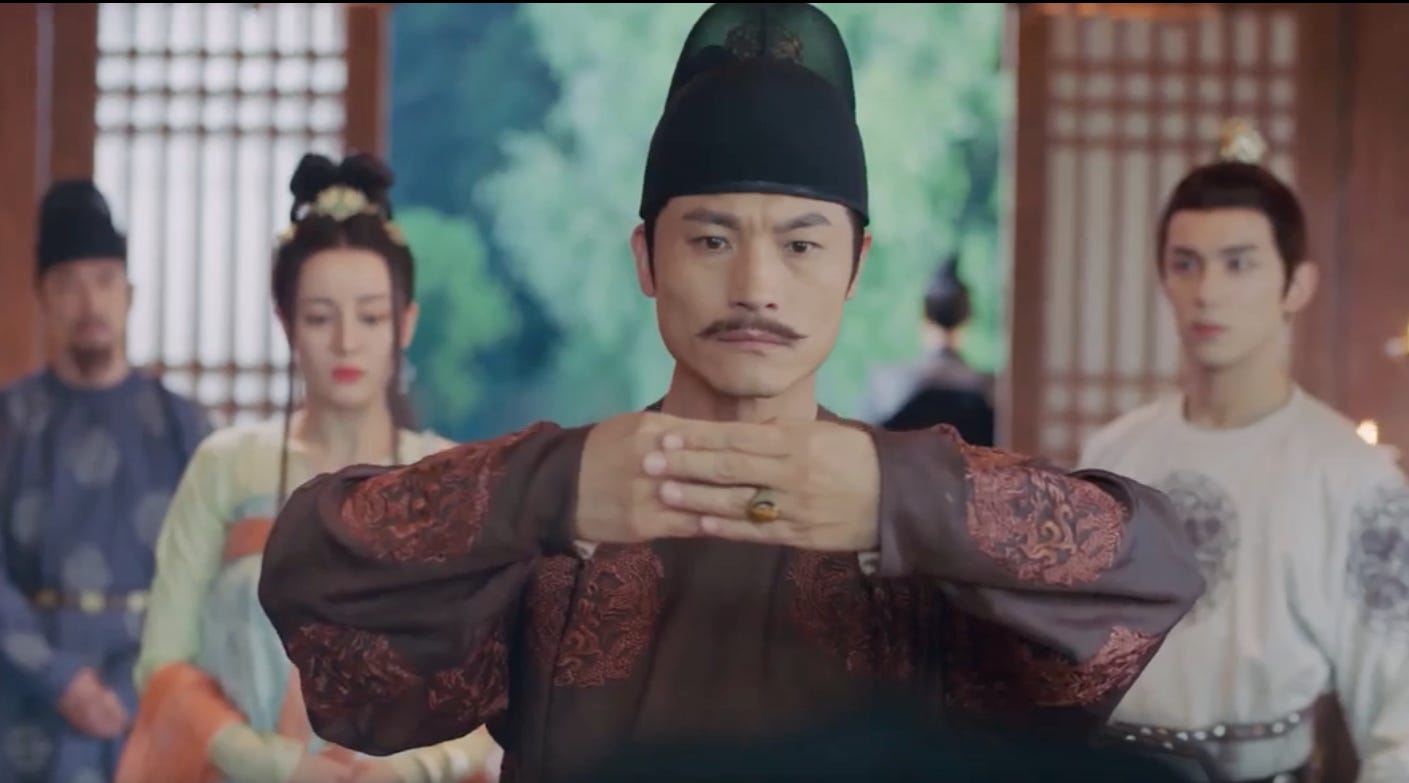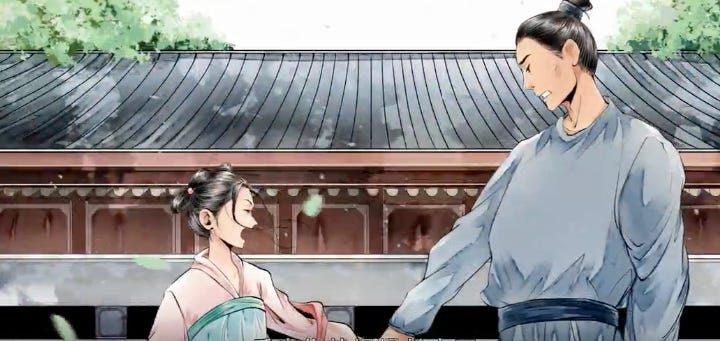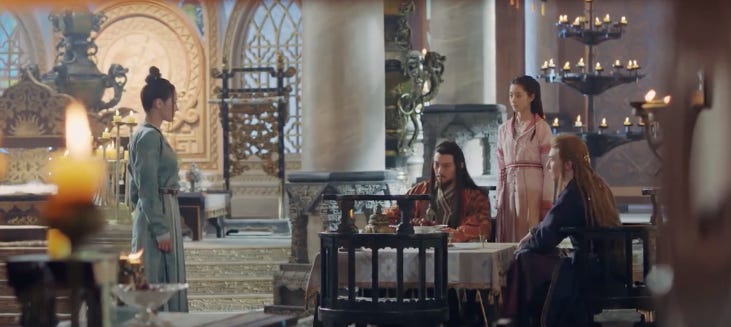The Long Ballad (2021) A Tale of Two Men
Beware of spoilers for Episodes 34-40.
If I say that I’m not watching this primarily for the romance I don’t think many people will believe me because I’m as much a fool for the leads as anyone else. It’s nonetheless true. This is a world, very much like the one we live in, of competing ideas about leadership, loyalty, commitment and service. Characters are not just characters but are also repositories of beliefs, ideas and culture that shift according to storytelling demands. Besides this is a journey of a young duchess who left the palace in a hurry and her gradual discovery that the world is a far more complex place than she once thought.
Now that Princess Yicheng has unleashed her long term agenda, it’s not hard to see where the show is headed in terms of an almighty clash not just of two geopolitical powers but of two personalities. Khatun is no great schemer by any stretch of the imagination but she has had the benefit of the passage of time and ready access to the Khan. She’s been exceedingly patient in playing her part. Moreover, she’s transformed herself into the archetypal devouring mother. The label sits well because conquest is very much a part of her ambitious scheme. She desires power for her son so that he can attain… so she thinks… his rightful place as the leader of his people and maybe the ruler of the world.
Knowing She’er, the lady is deluded. The kid doesn’t want power, he wants approval.
Yicheng’s sudden promotion to Big Bad holds little interest for me. That’s not to say her grievances have no foundation. Or that she has no place in the story. Still she’s had plenty of time to sulk and to mull about the terrifying deeds that await her enemies and she’s had access to the not-so-great Khan for some time. Clearly she’s fed-up, and had enough. Yan Li Khan did not exactly shower her with the milk of human kindness. Therefore the problems of the Ashile clan started much much earlier than her bid for power. It started a while ago with the Khan and little by little he is paying the price for his lack of effective leadership. The fractures were in all likelihood already in place long before Sun was competent enough to command troops. The irony of course (and very symbolic) is that he is now no more than a bedridden immobile puppet being strung along by the woman he mistreated for many years. How the mighty have fallen! What can’t be lost on the rest of us is that whatever power she might be holding is tenuously based on her access to the Khan. It’s all deception with no recognition of legitimacy. She is the de facto leader behind the scenes. With all her talk of wanting her son to run things, I can’t help wondering if it isn’t also an excuse to justify her lust for vengeance.
I don’t think it’s unduly harsh to say that Yan Li brought this upon himself. He, as he himself has declared unashamedly, is an admirer of strength. There’s no doubting his affection for Sun but I’m not sure how deep that goes if he’s playing mind games with him. Yan Li plays a game of divide and conquer among his commander and he’s certainly not past playing favourites. If not that, he makes little attempt to improve relations among his commander. It would explain why a boorish fool like Tukashi makes the cut as tegin. Yan Li is well aware that Sun is outstanding in every way, much more than the appointed successor. But he’s not blood and admiration can only go so far. There’s no doubt in the Khan’s mind that Sun’s not only the better warrior, he’s also a much better leader.
The whole issue of leadership is a thread that weaves right through the story. It is clearly foundational to the drama. It is factor that compels the disgruntled Changge to conclude in an earlier episode that Li Shimin is the best man for the top job. He is a figure of strength and unity in a way that Yan Li can’t be. His ability to set aside his ego, appreciate talent is why even Wei Zheng capitulates in the end. Using his personal name, he approaches Wei Zheng persistently to show his sincerity. He heals the wounds created by the eastern palace coup by offering amnesty to those on the opposing side. Why? It’s because he has the big picture in mind. The country first.
While watching the travesty at Shuzhou unfold, it seemed reprehensible that a key border town could be so poorly protected. Politics and espionage had also reared its ugly head ensuring that Gongsun Heng’s hands would be tied. The entire fiasco was a tragedy that could have been avoided. As governor of his city Gongsung Heng makes the choice to give up his life for the safety of the common people. With his back up against the wall, he turns to Sun because he knows this is a enemy leader who will act honourably. Of course the impetuous Changge wants to fight to the bitter end but he says rather poignantly that he is all about saving lives not winning battles.
More recently Sun finds it in his interest to ally himself with the desert states (foreigners) to save his entire battalion against another faction in the Ashile tribe as part of Yicheng’s calculated treachery. To protect his people, he goes along with a ruse that will see the end of Tukashi and the Bear battalion in the hands of the desert troops. The entire “invasion” of the northern states is a complete farce to eliminate Sun and the Eagle battalion.
The northern and southern desert states are at odds. The two kings bicker endlessly so it’s hard work getting them to the table. But with Changge as mediator they are pushed to show leadership and put their differences aside. The northern (elven) king sees the sense of what Changge is saying and shows leadership by promising to return territory to the south to expedite the alliance.
Consequently after the staged skirmish the Eagle battalion are officially destroyed. Unofficially they are hiding out at Mobei. Officially Sun’s dead and he is a Tegin no more. Changge asks him if he has any regrets. He says he has none because the Eagle battalion are no longer embroiled in other people’s selfish disputes and subject to the machinations of others.
Yan Li Khan’s deficient leadership gave birth to a monster like Yicheng who when Sun is absent from the steppes began executing her schemes. I should imagine it’s the beginning of the end for Ashile as a principal power in the region because the new management is much more interested in amassing power than saving lives.
All throughout the drama the link between good leadership and service is intentionally made. What immediately comes to mind is the poignant conversation between She’er and Sun just before the latter leaves the steppes in search of Changge. She’er attempts to persuade Sun to stay and wonders if Li Changge isn’t someone that Sun is putting ahead of the Eagle battalion. Sun’s response was Sun all over. As long as he is tegin of the Eagle battalion he is responsible but Changge is someone he has to protect even if his life is on the line. When he’s put things in order at home he will go looking for her even if it means going to the ends of the earth. She’er’s response is insightful. “I finally know why I always lose to you.” The penny drops. Sun’s dedication to people is what distinguishes him and what wins him their hearts. That’s how he, a former enemy can cause an independent woman like Changge to fall for him. His commitment to the welfare of his people is evident all throughout that it’s practically a motif in the drama.
That theme is reinforced once again in the story told about Li Shimin and Li Jiancheng’s tumultuous relationship with Changge’s mother. In part it’s a terrible tale of avarice and in part it is a story of Li Shimin’s honourable character. His commitment to Mum was wholehearted from the day he rescued her to the present in maintaining a shrine for her with regular personal visits. Li Shimin loved her but once when he was off to war, his brother in a state of drunkenness imposed on her sexually believing her to be his consort. Not long afterwards she was with child. When the child was born, Changge took to him more than her own father and Li Shimin raised her as his own. And as Wei Zheng says, no one loves this pair of mother and daughter more than he. The implication being that Li Jiancheng wasn’t the husband and father he could have been. For me this story also points to why Li Shimin is the emperor and not Li Jiancheng. From a messy situation Li Shimin took it on the chin and made the best of it.
All of this harks back to what I wrote back in my previous post about Li Jing’s teaching point of the invincibility of a benevolent heart.
This is a show of contrasts. A contrast of men… and women — why some are leaders and some only in name. The whole point of all the encounters on her journey is so that Changge herself hones her leadership skills not only in applying her intelligence but also her courage to bring adversarial parties together, advocating for peace for the common people not just in Tang but in neighbouring regions as well.











